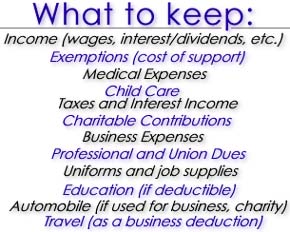|
Organizing your tax records
|
 |
March 22, 1999: 10:03 a.m. ET
When it comes to tossing tax documents, it's best to err on the side of caution
|
NEW YORK (CNNfn) - If you find yourself buried in paperwork as the April 15 tax deadline approaches or scrambling to remember how much mileage you racked up on business trips last year, you may be in need of some record-keeping first aid.
Organizing your tax documents throughout the year can prevent 11th-hour filing headaches and prepare you in the event of an audit.
More importantly, well-kept records "make it a lot easier to take advantage of the tax laws," said Kent Noard, a Certified Financial Planner professional.
By keeping track of all your out-of-pocket and other tax-related expenses, you lower your tax liability, which means Uncle Sam will get less of your hard-earned cash.
What to keep
One of the biggest mistakes some taxpayers make is keeping too much information on hand. There is simply no need to hoard records related to nondeductible expenses, such as personal phone bills, utility bills, canceled checks, credit card statements and the like.
What you should keep is all documents that relate to your current year income and deductible expenses. These are the records the IRS will ask for if you are audited.
For federal tax purposes, hold on to these records for at least three years from the date you file your return. After that point, the IRS can no longer call on you to prove your income or deductions, unless it suspects you've underreported your gross income by more than 25 percent. In that case, the IRS has six years to challenge your return.
If you fail to file altogether or file a fraudulent return, the IRS has an indefinite time limit to challenge your return.
"Those people tend to know who they are," said Noard. "For the average wage earner, holding on to records for three years is plenty."
State statutes sometimes exceed federal limitations, so state returns should be kept for as long as four years after you file, depending on where you live.

As a general rule, the Institute of Certified Financial Planners recommends tax returns be stored indefinitely and supporting documents, including W-2 forms, 1099s and relevant receipts, be kept for six years.
If you've lost an old tax return, don't despair. You can get a copy from the IRS for $23 by filing a Form 4506 or Request for Copy or Transcript of Tax Form. The IRS usually can provide returns from the last six years.
The tax breaks are in the details
Diligent record-keeping is most important if you take itemized deductions on your tax return.
If you have a home office, for example, you'll want to keep all records that show part of your house is used for work, such as receipts for supplies.
To deduct costs related to charitable contributions, a canceled check or receipt from the organization will generally do. For a single donation over $250 or non-cash donations, you must save the receipt from the charity that shows the date and what you donated.
Any out-of-pocket expenses, such as costs related to medical treatment, volunteering or business, will have to be logged on a regular basis. These may include public transportation costs to and from charity work or parking fees, tolls and taxi fares related to your job.
Unless you own or operate your own business, record-keeping does not have to be elaborate.
"The biggest mistake regarding record-keeping is not writing things down or not remembering where you wrote it down," said David Mellem, research manager for the National Association of Tax Practitioners.
Consider keeping a small calendar handy to jot down out-of-pocket expenses, such as car mileage and business entertainment costs, throughout the year.
"As long as it looks reasonable and like it was written as it happened, that's fine," Mellen said.
Tax preparation will go a lot smoother if you have these details, as it is unlikely you will be able to dig up or remember out-of-pocket costs long after you incurred them.
Compile receipts in a central place. Storing receipts in a box until the end of the year is fine, although you should transfer the records into labeled envelopes or folders when tax season comes along. In addition, it may be helpful to separate each year's records.
If you use computer software, such as Quicken or TurboTax, to keep track of your tax records, remember to hold on to hard copies of relevant receipts.
Preparing for the future
Audits are not the only reason to keep tax-related documents. Tax returns can contain information you may need down the line.
"Holding on to the receipts that back up a tax return is not so important," Mellem said. But "keeping a copy of your tax return forever is not a bad idea."
When the time comes to collect social security, for instance, you may need to verify your contributions. Copies of past returns are an easy way to confirm what you earned if there is a dispute.
Homeowners, in particular, will want to hold on to their records for the long term, as they are likely to face capital-gains taxes in the future. Capital-gains taxes come into play when you sell your house or apartment without replacing it with property of equal or bigger value within two years.
To calculate your capital-gains tax, you will need to have all records documenting home improvements, additions and expenses involved in buying and selling your home, including brokerage commissions and legal fees. These records include your purchase contract and settlement papers if you bought the property or other objective evidence if you acquired it by gift, inheritance, or similar means.
Documents that help establish the cost basis or adjusted basis of your home should be kept for six years after you sell the property.
The same holds true for your investments, which may eventually be subject to capital-gains taxes. Keep all records documenting purchases and reinvestments until six years after the sale of the investment. You can toss monthly statements once you get an annual report summarizing all activity during the year.
Any records of nondeductible contributions to an IRA, noted on Form 8606, also should be kept indefinitely. Those records will help prove you have already paid taxes on contributions when the time comes to withdraw them.
"The laws may change on us later on," said Noard, which is why it's important to err on the side of caution when deciding which tax records to keep and which ones to toss. 
-- by staff writer Nicole Jacoby
|
|
|
|
|
 |

|

